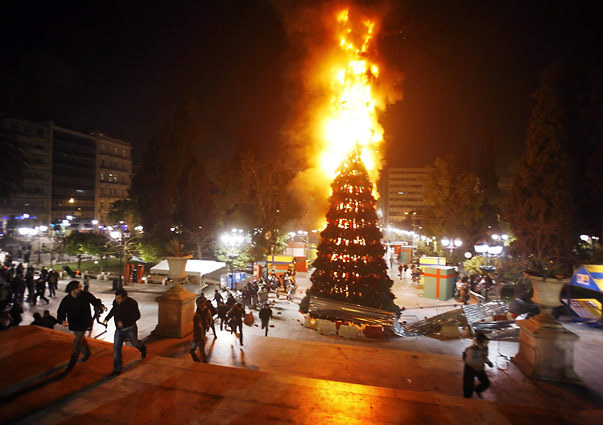

Posted 11 Dec 2008
[caption id="" align="alignright" width="386" caption="ARIS MESSINIS / AFP/GETTY IMAGES"] [/caption]
[/caption]
As Iceland showed the collapse will not be televised. The police shooting of a Greek teenager has sparked the worst riots in decades. Athens is paralyzed and other Greek cities lethargic with a near-general strike from protesters seeking to unseat the government. The strikes are affecting transport systems and essential systems will probably be shattered.
Despite the season, in Athens the large Christmas tree, center of Constitution Square and many surrounding areas have been torched. The riots, already lasting five days, will probably be extended even longer. The government is under extreme pressure and as the pictures reveal the country is being brought to its knees. Political machinations are ruining the stability of nations.
But is the cause the police shooting of a 15 year old son of a bank manager? The Greek have a long-history of passionate argumentation and clashing with their authorities. However, these riots are the worst in decades. The U.S. military supported junta that seized power and ruled by dictate in 1974 sparked severe protests back then. Most of the opposition came from students.
Students played a pivotal role that helped bring down the colonels in 1974, legitimize Greece and set it on the path to become a member of the European Union. This solidified protests and riots as a political tool and to this day Greek law prohibits police from entering university campuses which now act as a safe haven for protestors to plot and regroup.
The center-right government of Prime Minister Konstandinos Karamanlis has its hands full and hangs onto power with a hair-like majority of two. The disillusionment of citizens has led to tremendous violence, destruction and looting with these recent riots. While there is dissatisfaction at many levels two issues stand out (1) handling of the fading Greek economy and (2) the perception of widespread corruption. The promised reform of Karamanlis's party has slowed and hapless state-owned enterprises have not been privatized and instead left behind.
 The Eurozone is particularly hard hit, perhaps more than the United States, by the economic crisis and the Euro gold price has been reacting.
The Eurozone is particularly hard hit, perhaps more than the United States, by the economic crisis and the Euro gold price has been reacting.
Greece, like the United States, appears to be owned and run for the benefit of their over-leveraged failing bankers. A recent $36B bailout represents 12% of GDP. Because of Greece's adoption of the Euro they are under additional pressure. Pension plans and social welfare may need to be cutback to fund a stimulus package. These cuts will likely spark additional riots and protests.
The Euro zone may face additional strains causing a fracture like the Federal Reserve Note is facing pressure as California mulls issuing their own currency. The likelihood of secession from various States is increasing. Will the California Dollar bear a bear like the California Republic flag? All of this is bearish for the stock market and the Dollar.
On another topic I wrote about earlier, Canada's leader of the opposition quits early and the coalition appears to be crumbling which may put additional pressure on Prime Minster Steven Harper. While unlikely parliament was suspended and Mr. Harper will continue in office.
The dollar has fallen relative to gold whose dollar price has risen nearly $60 in the past week and over the last 30 days $92.90 or 12.43%. Gold is near all-time highs priced in Australian Dollars (1,232.62), British Pounds (547.21), Brazilian Reals (1,968.95), Canadian Dollars (1,017.18), Euros (621.61), Indian Rupee (39,427.52), Mexican Peso (10,834.07) and the Russian Ruble (22,526.55). Backwardation appears to have subsided and it appears increasingly unlikely of a COMEX default despite the warehouses losing inventory with 12,636 total demanded for delivery in December. Nevertheless, the differences in price at a mere ~$1/month/ounce do not appear to compensate adequately for the counter-party risk.